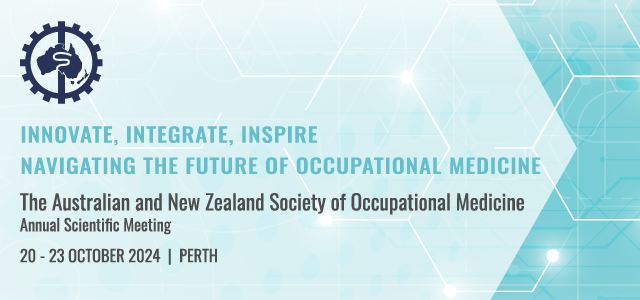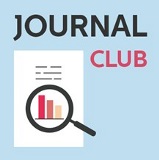AFOEM eBulletin - 31 May 2024
It was pleasing to meet many members in Sydney earlier this month at Congress 2024 and the following Annual Training Meeting (ATM). Professor Neil Greenberg provided the opening keynote and Ferguson-Glass Oration and spoke on mental health for healthcare workers. His presentation was entertaining, informative and provided practical advice. His presentation was acknowledged by several attendees as the most interesting presentation of the day.
Professor Greenberg later participated in a panel discussion on health and wellbeing, with useful contributions from Dr David Beaumont and Dr Jillann Farmer. Jillann introduced the term “Occupational health”, emphasising the importance of health advice in work, health and safety. The nine Ramazzini presentations again were of a high standard and demonstrated the wide experience of our trainees. Congratulations to Dr Jane Muir as the Ramazzini Prize winner for 2024. Jane is expected to be invited to present at the ANZSOM meeting in Perth in October. I was delighted to present Jane with the Deane Southgate Award at the College Ceremony on Saturday afternoon. I also presented Dr Sheila Uyirwoth with the President’s award for trainee activities at the Gala Dinner.
The Annual Members meeting on Friday morning provided updates on AFOEM activities and we were delighted that the new President of the RACP, Professor Jenny Martin, and the interim CEO, Steffan Faurby both attended. Following the President’s report, Dr Armand Casolin PSM provided an update on our policy and advocacy work, and Dr Rod Nicholson provided an update on issues in Aotearoa New Zealand. Issues facing AFOEM are common in both countries. Unfortunately, Dr Tony Brown was unable to attend so his report on education and training was presented on his behalf.
I would like to thank Dr David Crocker for his extensive contribution to the Congress and AFOEM program. This appeared to run smoothly and reflects the planning and attention to detail.
Dr Peter Yu put together an excellent training program on the weekend following Congress and work visits on the Monday to a number of sites around Sydney, including the SBS studios. The ATM was attended by 45 trainees and held in the RACP office at level 27, 1 O’Connell Street, Sydney. Most sessions were highly interactive with key messages for all stages of training.
I must also give credit to both Jo Goldrick and Eva Kosinski for their extraordinary support during Congress, the Annual Members Meeting and the ATM. Eva is the Executive Officer (EO) for AFPHM, yet willingly provided support during unexpected departures of the AFOEM EO and Faculties Administrative Officer. The good news is that Jane Konjevic commenced as the AFOEM EO on 27 May. Jane has a Master of Teaching degree and we warmly welcome her.
Finally a reminder that the National Occupational Respiratory Disease Registry began operating on 22 May 2024 to capture and share data on the incidence of occupational respiratory diseases, causative exposures, and respiratory health data.
Dr Warren Harrex
AFOEM President
Council has approved two occupational and environmental medicine promotional videos which were recently developed by the College. The first video can be viewed on the AFOEM webpage. However, the second video requires worksite photographs to further enhance the message.
If you have photographs of a worksite that you are willing to share, we would appreciate it if you would email it to AFOEM@racp.edu.au for possible inclusion in the video. If you have any queries, please contact the Faculty office using this email address.

The Australian and New Zealand Society of Occupational Medicine (ANZSOM) Western Australian Branch is hosting the Annual Scientific Meeting (ASM) on 20 to 23 October 2024, in Perth. The theme for this year's event is: 'Innovate, Integrate, Inspire | Navigating the Future of Occupational Medicine'.
The 2024 ASM is shaping up to be an enriching educational conference that promises valuable insights, networking opportunities, and practical strategies. The conference committee is working tirelessly to create a diverse program featuring presentations, workshops, site visits, and panel discussions led by industry experts.
So, mark your calendar and start planning your attendance, as we highlight cutting-edge innovations, foster collaboration across various sectors, and inspire fresh approaches that will shape the future of our profession.
Sponsorship opportunities are available. Find out more
The Council of Therapeutic Advisory Groups (CATAG) has published a Medicines Advice Initiative Australia (MAIA): Cumulative Medicines toolkit.
The toolkit consists of a practice tool and a teaching tool:
- The practice tool has been developed to share resources with Medicines and Therapeutics Advisory Committees and hospitals to assist to identify people at “hidden risk” of cumulative medicines toxicity. This will support implementation of local medicines stewardship programs, and promote safe and appropriate deprescribing.
- The teaching tool has been developed to be used by clinical educators in teaching sessions for medical officers, nurses, pharmacists, and students. It provides a clinical example of assessing potential cumulative medicines risk in the hospital. It can be used by educators to demonstrate the use of different tools to facilitate risk assessment and encourage deprescribing in hospitals.
MAIA is a consortium dedicated to improving the use of medicines and related health services in Australia.
For more information, visit the CATAG website

Women & Leadership Australia has announced new scholarships to enable more women to access world-class leadership and workplace skill development programs. By combining cutting-edge leadership theory with practical application, and a flexible part-time delivery, Women & Leadership Australia offers an unparalleled learning experience designed to fit into your busy schedule.
With partial scholarships ranging from $1,000 to $5,000, there are four programs to suit women in non-leadership roles all the way up to senior executives. Applications close on Friday,14 June 2024 unless allocated prior.
Find out more

Type 1 diabetes has a very high treatment burden in terms of direct costs, inconvenience and lost productivity for patients and their carers. Further, all the glucose checking, hormone replacement and consults don’t abolish the vascular complications associated with poor glycaemic control. Only in the last few years has it been possible to pharmacologically alter the course of type 1 diabetes and other auto-immune diseases without generating intolerable side effects.
Teplizumab is an antibody to CD3 which was presented to the world in 2019 as delaying the onset of type 1 diabetes in high-risk individuals thanks to its protective effect on pancreatic β-cells. It has not yet been registered by the Therapeutic Goods Administration but another immunomodulatory drug called baricitinib has. Baricitinib is an inhibitor of Janus Kinases indicated for the treatment of rheumatoid arthritis, alopecia areata, atopic dermatitis and even COVID-19.
In December of last year, the results of a Phase 2 trial in patients with new-onset type 1 diabetes were published in the New England Journal of Medicine. After almost a year of taking the oral therapy, patients were found to have better glycaemic control and evoked C-peptide levels than those taking placebo, indicating a preserved ability to secrete insulin. In today’s episode, Pomegranate’s in-house endocrinologist interviews two of the study authors.
Key Reference
Baricitinib and β-Cell Function in Patients with New-Onset Type 1 Diabetes [NEJM. 2023. 7;389(23)]
Guests
Prof Jenny Couper FRACP FAHMS (Women's and Children's Hospital, University of Adelaide)
Dr Michelle So FRACP (Royal Melbourne Hospital, Northern Hospital)
Guest Host
Dr Rahul Barmanray FRACP (Royal Melbourne Hospital)
Please visit the Pomegranate Health web page for a transcript and supporting references. Login to MyCPD to record listening and reading as a prefilled learning activity. Subscribe to new episode email alerts or search for ‘Pomegranate Health’ in Apple Podcasts, Spotify, Castbox or any podcasting app.
The RACP podcast, Pomegranate Health, has published over 100 episodes since starting out eight years ago.
To provide more frequent and focused content we’re seeking contributions from our speciality societies, committees and affiliated professional organisations.
To hear what this would sound like, listen to the episodes tagged [IMJ On-Air]
These episodes feature authors published in the Internal Medicine Journal being interviewed by the relevant section editor.
They have covered themes as varied as asthma management, hospital-acquired complications, causes of readmission and the JEV outbreak.
You already spend considerable time preparing lectures and webinars for your colleagues.
Audio podcasts provide an easy way to reach thousands more around the world.
Each episode gets downloaded around 6500 times over the first 12 months from publication, with 21 per cent of listeners located outside of Australia and Aotearoa New Zealand.
All you need to do is to organise one or more presenters and an interviewer familiar with the material. The podcast producer will coordinate an online recording lasting about one hour and then edit it down before publication. The intention would be to ‘brand’ regular episodes from your specialty society or organisation in the same way that we’ve done with [IMJ On-Air].
Please send any questions or ideas to podcast@racp.edu.au

As doctors, your career is all about improving the health of others — but sometimes this can come at the cost of looking after your own. While you may be less likely to suffer from lifestyle-related illnesses, reports have shown that you are more vulnerable to mental health and wellbeing issues compared to the general population.
The RACP’s previous work on the Health of Doctors identified that one reason you may struggle with self-care is due to your natural tendency to prioritise others before yourself. This risk can lead to negative impacts on your own health, which can in turn affect patient care and their families.
To raise awareness about the importance of prioritising your health and wellbeing while supporting your professional journey, the College’s Member Health and Wellbeing Committee developed the RACP Member Wellbeing Framework. The Framework sets out overarching domains of wellbeing, provides links to relevant resources for each domain and includes a link to an evidence-based self-assessment tool, plus so much more.
Read the Framework or find out more

Do you know that as part of your membership, you now have access to the ROC (RACP Online Community)? The ROC is a secure online platform where you can post questions, share information, and start discussions which other members can immediately see and respond to. If you haven’t used this type of platform before, think of it as a virtual town hall for the entire College and a series of different online common rooms for different Divisions, Faculties and Chapters. It’s prompt and more accessible than email and is a great way to expand your network across the College.
Download the app from the App Store or Google Play, or log in via MyRACP

Save on all your favourite lifestyle and service brands from leading retailers across Australia and Aotearoa New Zealand – with RACP Benefits. Our new lifestyle benefits portal offers you exclusive discounts and genuine savings on items in a range of popular categories. To celebrate the launch of RACP Benefits, we have some great offers for you to explore.
So log in today and take advantage of your RACP Benefits

By completing your ‘work profile’ you will provide us with valuable insights which we can use to make evidence-based and informed advocacy decisions for improving workforce planning. All you need to do is log in to My RACP, click ‘update my work profile’ and answer a few questions about your work activities.
Complete your ‘work profile’
Did you know that you can now update your address details online? Simply log in to MyRACP and go to 'Edit my details'.
AFOEM contact details
AFOEM Faculty enquiries (including Council and committees):
AFOEM Executive Officer
Jane Konjevic
Email: afoem@racp.edu.au
AFOEM Education and Training enquiries:
Education Officer
Phone: +61 2 8247 6268
Email: occenvmed@racp.edu.au
AFOEM Examination enquiries:
Examination Coordinator, Assessment Services
Email: faculty.examinations@racp.edu.au
AFOEM training site accreditation inquiries:
Site Accreditation Unit
Email: accreditation@racp.edu.au
AFOEM CPD enquiries:
Email: mycpd@racp.edu.au